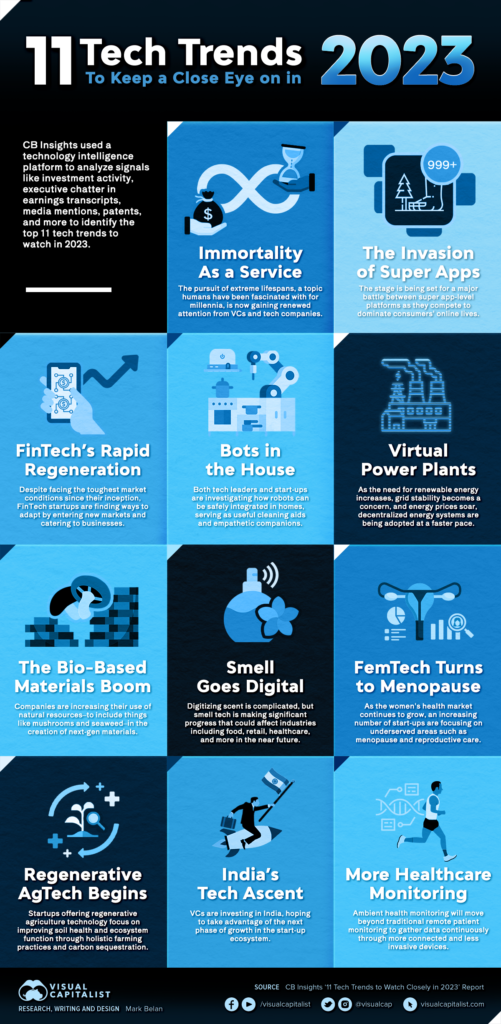by Nick Routley

Infographic: 11 Tech Trends to Watch in 2023
It can be tough to keep up with the rapid pace of innovation.
Each new year delivers the full spectrum of progress from game-changing breakthroughs to incremental advancements in a wide variety of fields.
In a noisy media landscape fueled by hype and speculation, it can be tough to know where true value is being created. The infographic above, which draws from CB Insights’ recent report on 11 Tech Trends To Watch Closely in 2023, helps narrow down some areas of focus:
- Immortality-as-a-service
- The secret invasion of super apps
- Fintech’s rapid regeneration
- Bots in the house
- Virtual power plants
- Healthcare’s invisibility trick
- Smell goes digital
- Femtech turns to menopause
- The bio-based materials boom
- India’s tech ascent
- Regenerative agtech takes root
The report draws information from earnings transcripts, media mentions, investment activity, patents, and more to arrive at the trends listed.
We’ll examine three of these trends below in a bit more detail.
Setting the Stage: Clash of the Super Apps
The concept of a super app—an all-in-one smartphone application that integrates a wide range of services—is far from new. In fact, for years now, WeChat has been the go-to app for many Chinese citizens to chat, order services, pay bills, and more.
A natural question comes to mind: why doesn’t an app like that exist in Western countries yet? Well, there are a couple of key reasons:
- Consumers and regulators alike are wary of providers holding so much personal information and power. In China, WeChat actually had government support, integrating public services into the app. As well, expectations of personal privacy are completely different in China than in Western countries
- Unlike China, which rapidly adopted digital payments, North America and Europe had preexisting near-ubiquitous financial networks in place. Super apps were a game changer for millions of unbanked consumers in China and beyond.
The situation is changing rapidly though, and 2023 could be the year that the foundations are laid for a clash of various Big Tech incarnations of the super app.
In late 2022, Microsoft was rumored to be building a super app using Bing as the foundation, and recent investment into ChatGPT adds fuel to that fire. Even Elon Musk hinted at his ambitions to turn Twitter into a one-stop-shop for just about everything.
There are still significant barriers to bundling a plethora of services into a single app, but that isn’t stopping companies from racing to be the one to do it. To the victor go the spoils.
The Resiliency of Life Extension
The concepts of immortality and age reversal have been a preoccupation of mankind since the dawn of time, so it stands to reason that technology that promises extra lifespan and quality of life continues to be compelling for individuals and investors alike.
Players in this space can approach life extension and anti-aging from a number of different angles, from supplements to tinkering at the cellular level.
Two high-profile examples in this space are Calico, which is a subsidiary of Alphabet, and the Jeff Bezos-backed Altos Labs. Other billionaires have expressed an interest in life extension as well, including Peter Thiel, who has definitive views on mortality.
I believe if we could enable people to live forever, we should do that. […] I think it is against human nature not to fight death. – PETER THIEL
In 2023, look for more investment and news from startups focused on gene therapy, genome analysis, regenerative medicine, or “longevity in a pill”.
Beyond Plastic: The Bio-Based Materials Boom
Public pressure is mounting for producers of consumer goods to change the way they manufacture their products.
The good news is that many of the largest producers of consumer packaged goods and apparel have some kind of plan in place to use more post-consumer recycled plastic in their products. The bad news is that not enough plastic is recycled globally for companies to source enough material to produce their products more sustainably. As a result, many companies are exploring the option of ditching plastic entirely.
For example, materials derived from seaweed are an active area of innovation right now. Mushrooms and algae are also commonly-used materials from nature that are being used to create biodegradable products. In one particularly interesting example, a company called MycoWorks recently began working with GM Ventures to explore the use of mycelium-based leather alternatives in GM’s vehicles.
While researchers and companies are just scratching the surface of what’s possible, consumers are likely to see more tangible examples of bio-based materials popping up in stores. After all, brands will be very eager to talk about their increasingly plastic-free product lines.



